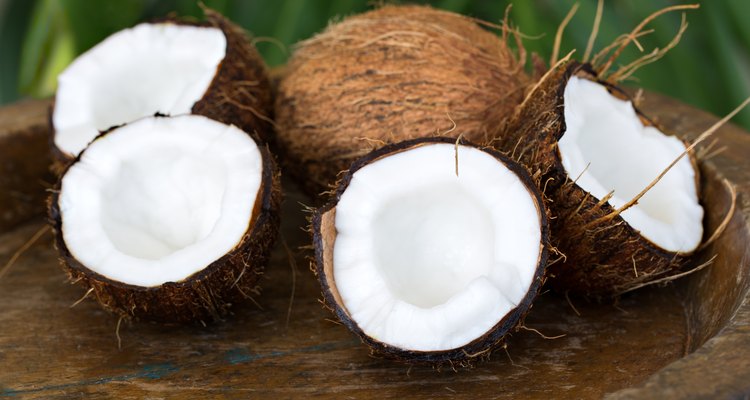
Olgaorly/iStock/Getty Images
People often use dried coconut to add flavor to their sweet and savory dishes because it is easier to use and more readily available than fresh coconut. Coconut is a good source of fiber and certain minerals, but is also high in saturated fat. The type of saturated fat it contains, however, may be healthier than other types of saturated fat.
Calories and Macronutrient Content
A 2-inch by 2 1/2-inch piece of fresh, raw coconut has 159 calories, 1.5 grams of protein, 6.9 grams of carbohydrates and 15.1 grams of fat, including 13.4 grams of saturated fat, or 67 percent of the daily value. An ounce of unsweetened dried coconut has 185 calories, 1.9 grams of protein, 6.6 grams of carbohydrate and 18.1 grams of fat, including 16 grams of saturated fat. Sweetened, dried coconut provides 128 calories, 0.9 gram of protein, 14.5 grams of carbohydrates and 7.8 grams of fat, including 7.4 grams of saturated fat per ounce. Unsweetened dried coconut contains less water than sweetened, which is why it has more calories per ounce.
Micronutrient and Fiber Content
Coconut provides significant amounts of fiber, manganese and copper. Fiber helps lower your cholesterol and heart disease risk; manganese helps heal wounds and form strong bones; and copper helps form red blood cells and keep your immune system healthy. Raw coconut has 16 percent of the DV for fiber, 34 percent of the DV for manganese and 10 percent of the DV for copper per serving. A serving of unsweetened dried coconut provides 18 percent of the DV for fiber, 38 percent of the DV for manganese and 11 percent of the DV for copper; and a serving of sweetened dried coconut contains 11 percent of the DV for fiber, 13 percent of the DV for manganese and 4 percent of the DV for copper.
Coconut and Cholesterol
Consuming high amounts of saturated fat can increase your low-density lipoprotein, or bad cholesterol, and your heart disease risk. The saturated fat in animal products consists mainly of long-chain triglycerides, but the saturated fat in coconut oil consists mostly of medium chain triglycerides, which may provide health benefits. In a study published in the "Asia Pacific Journal of Clinical Nutrition" in 2011, people who consumed more coconut oil had higher levels of high-density lipoprotein, or good cholesterol, compared to those who didn't use as much coconut oil. Only virgin coconut oil has this effect because refined coconut oil contains trans fat, which increases your LDL cholesterol while decreasing your HDL cholesterol.
The Sugar Issue
Raw coconut and unsweetened dried coconut contain only 2 grams to 3 grams of sugar per serving. Sweetened dried coconut, however, has 10.3 grams per serving. Consuming too much added sugar may increase your risk for obesity and heart disease, according to the American Heart Association, which recommends women limit added sugars to 25 grams per day and men, 37.5 grams.
Related Articles

Nutrients and Fiber in Coconut

Properties of Coconut Fiber
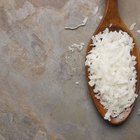
How to Toast Fresh Coconut

Does Shredded Coconut Go Bad?

The Nutrition in Coconut Powder

The Sugar in Mangoes

The Benefits of Drinking Coconut Water

How to Freeze Fresh Raw Coconut

How to Make Fresh Strawberry Frosting ...

How to Remove the Shell From a Coconut
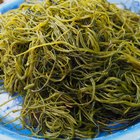
The Calcium Content of Spirulina

Can I Substitute Unsweetened Coconut ...

Shredded Coconut Substitute
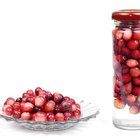
How to Make Cranberry Juice from Fresh ...

Health Advantages of Coconut Water

How to Cook Nigerian Coconut Rice

How to Blanch Cashews

Is There Glucose in Soda?
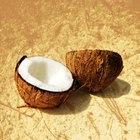
What Does Coconut Acid Do in Soap?

Vegan Coconut Macaroons
References
- MedlinePlus: Copper in Diet
- Linus Pauling Institute: Manganese
- University of Illinois Extension: Eating for Cadiovascular Health
- Asia Pacific Journal of Clinical Nutrition: Coconut Oil Predicts a Beneficial Lipid Profile in Pre-Menopausal Women in the Philippines
- American Heart Association: Sugars 101
- Fine Cooking: Coconut Desserts
Writer Bio
Based in Massachusetts, Jessica Bruso has been writing since 2008. She holds a master of science degree in food policy and applied nutrition and a bachelor of arts degree in international relations, both from Tufts University.
Photo Credits
Olgaorly/iStock/Getty Images